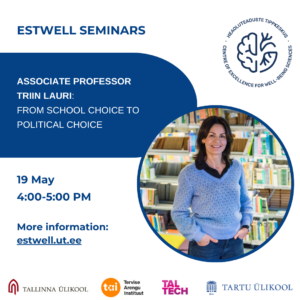
- This event has passed.
EstWell seminar
Associate Professor Triin Lauri: From School Choice to Political Choice

Why does the issue of school choice tend to spark near-hysterical reactions every spring in Estonia, a country committed to the comprehensive school model? How can school places be distributed in a knowledge society that values diversity of choice — without deepening educational stratification? What are Estonians’ preferences when it comes to education, and how much are these shaped by personal background, fairness perceptions, or the existing school system? And what does all of this have to do with policy feedback effects and political polarization?
This seminar offers a bird’s-eye view of Triin and her co-authors’ recent social scientific perspectives on education research — with a particular focus on school choice and the dynamics of educational inequality.

